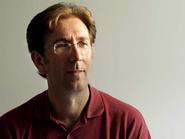
D.T. Max, a staff writer for The New Yorker, visited Hamilton to give a talk on careers in journalism on March 3. Sponsored by the Career and Life Outcomes Center, Max’s talk addressed an audience full of aspiring novelists, editors and journalists. Max began by telling the story of his own professional journey—which he insists had no clear trajectory—and followed up with advice for budding writers.
A comparative literature major at Harvard University, Max considered himself a poor student who was “borderline insubordinate” during his first job out of college as an editorial assistant in New York. After Max rose to the position of associate editor, he was fired, and then took on a number of editorial positions with magazines including Vogue, Esquire, GQ, and Harper’s Bazaar.
Medical circumstances then required Max to work from home, a situation that ultimately prompted Max to transition from editing to writing. According to Max, he was “always a writer at heart, rather than an editor” and found writing “absorbing, fascinating, and endlessly rewarding.” In 2006, at the age of 45, Max published his first book, The Family That Couldn't Sleep: A Medical Mystery. More recently, Max he published his first biography, Every Love Story Is a Ghost Story: A Life of David Foster Wallace, which then became a New York Times bestseller.
Max’s talk then transitioned into the recent decline of print media and current state of creative industries, and he offered students several pieces of practical professional advice. Max strongly advocates that anyone aspiring to be a writer spend two years living in New York City, which he believes provides an individual with experiences from which he or she can grow, develop and write. He emphasized that “learning by doing is still a big part of journalism.”
Max also acknowledged the financial strain of such an existence. He noted, however, that if one is fortunate enough to have the resources and support to pursue writing in the city, he or she should by all means do so. If not, he suggested alternatives, such as working a variety of day jobs.
Heather Wixson of the Career Center also reminded the audience that Hamilton students have access to summer internship funding from the Career Center, and can also connect with Hamilton alumni to learn more about internships and potential jobs in either publishing or editing.
Max also recommended that students interested in writing fiction should consider Masters of Fine Arts programs, as the path of academia provides a level of financial and creative support that many writers will appreciate. He suggested that students interested in magazine journalism should consider exploring website publications. While Max does not believe that print magazines as they currently exist will endure into the future, he does believe that the skills required for magazine journalism will transfer to the online sphere. After all, he noted, “We all have a basic need for narrative, fact and well-researched pieces.”
Max concluded his talk with a few final observations. According to Max, “the drawback of the web era is that it’s extremely hard to make even a tenth of a living. But the blessing is that no one can stop you from publishing.”
Posted March 5, 2015
